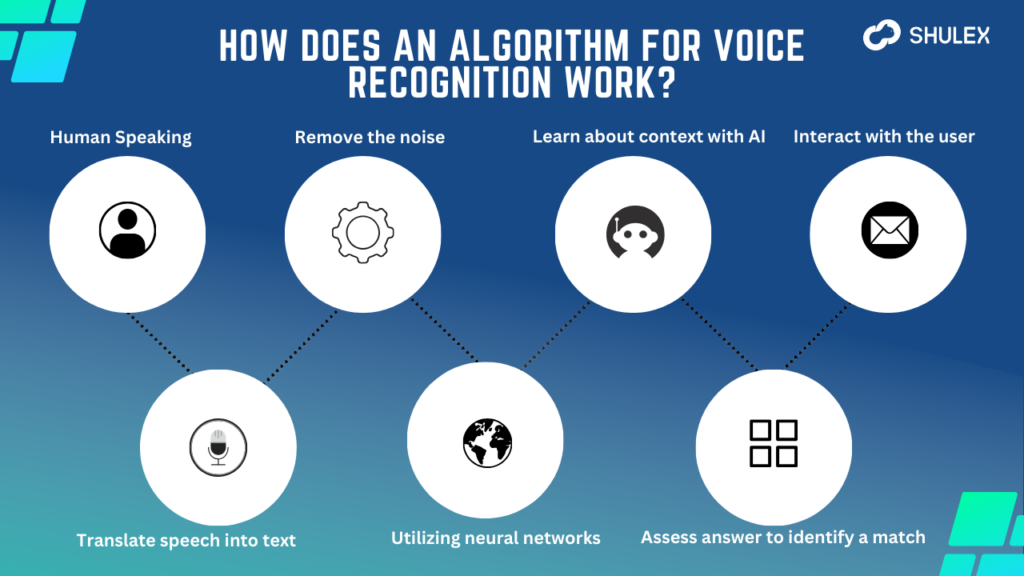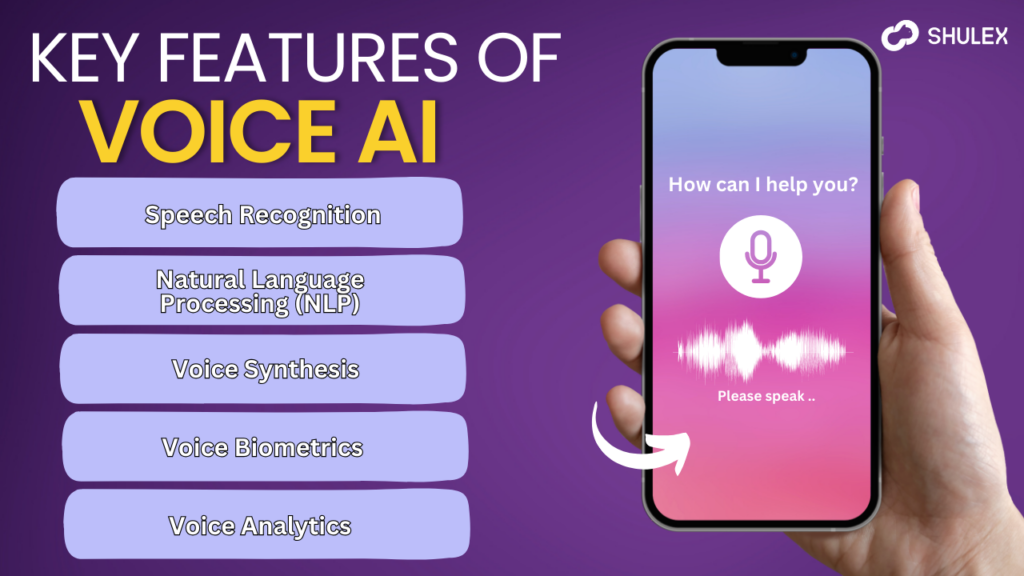
The ability of voice bots to offer a hands-free customer experience is simply remarkable. Customers can order products from your website while preparing their meals. Voice AI can give your customers a hassle-free experience and block out any obstacles so they can multitask.
Businesses have benefited greatly from voice AI, and as a result, the market is trending. The voice-activated speaker market is projected to reach a value of $30 billion by 2024.
You should learn everything there is to know about the subject before utilizing voice bots. This will enable you to get the most out of the tool and maximize your results. This article will teach you about everything you need to know on Voice Ai.
In this article you will know:
- What is Voice Ai?
- How does an algorithm for voice recognition work?
- Key features of Voice Ai
- Top 10 benefits of Voice Ai
- Realistic AI Voices with the Best AI Voice Generator
- Wrapping Up-Voice AI
Related-must Read:
- WhatsApp Chatbot: How to create WhatsApp bot?
- Chatbot Vs. Conversational Ai- Everything you need to know
- Banking Chatbots: Making use of AI’s Full Potential to Transform the Banking Sector
- Conversational AI: A Comprehensive Manual
What is Voice Ai?
Voice Ai is machine learning-capable software that uses a voice user interface (VUI) to take commands and provide results—such as that found in voice assistants like Alexa, Siri, and Google Assistant. “Voice AI” typically refers to technologies and systems that involve the use of artificial intelligence (AI) to process and understand human speech. This field encompasses various applications, including speech recognition, natural language processing (NLP), and voice synthesis.
How does an algorithm for voice recognition works?

- Human Speaking– ASR/STT is a technology that translates spoken language into text that can be read by computers. A recognition algorithm, a pool of words, and their phonics are used to accomplish this.
- Remove the noise– Voice AI may occasionally receive human messages that contain unclear glitches or noise. As an example, suppose you were in a movie theater, and you got a call from customer support. Your message may not be understood over the background noise. This message can be filtered, and the precise message can be recorded, all thanks to voice AI. Then, a voice bot can react more accurately and address the customer’s problems.
- Learn about context with AI– A computer interprets the human message and decodes it using STT so that it can respond.
- Interact with the user– Voice AI carefully lists conclusions after understanding the user-generated message so that it can reply to the customer. The optimal response is then chosen by the response evaluation algorithm to be sent as the final response message.
- Translate speech into text– is a speech recognition software that enables the recognition and translation of spoken language into text through computational linguistics. It is also known as speech recognition or computer speech recognition.
- Utilizing neural networks- Neural networks are the structural basis of artificial intelligence, just like they are in the human brain. These neurons divide the text string into manageable chunks and search the pre-existing data pool for the best match. Voice AI matches the customer’s query with the best possible result after analyzing the entire text.
- Assess answer to identify a match- An audio version of the final response is created and stored for later use before being sent to the customer. After that, it is forwarded in answer to the client’s inquiry. The whole process happens very quickly, and people don’t even realize they’re speaking with a voice bot.
Key Features of Voice Ai

- Speech Recognition: Voice AI systems can transcribe spoken words into text. This technology is widely used in voice assistants, transcription services, and voice-activated commands.
- Natural Language Processing (NLP): NLP enables machines to understand and interpret human language, allowing for more advanced interactions. Voice AI with NLP capabilities can comprehend context, intent, and sentiment in spoken language.
- Voice Synthesis: Also known as text-to-speech (TTS), voice synthesis involves converting written text into spoken words. This is commonly used in applications like virtual assistants, audiobooks, and accessibility tools.
- Voice Biometrics: Voice AI can be employed for biometric authentication by analyzing unique characteristics of an individual’s voice. This is used for security purposes in some systems.
- Voice Analytics: In business and customer service applications, Voice AI can be used to analyze recorded calls for insights into customer sentiment, preferences, and interactions.
Top 10 benefits of Voice Ai

- Optimized client assistance– In fact, customer service involves a lot of repetitive work, such as answering basic FAQs, sending emails, and obtaining feedback. Your team can automate tedious tasks and streamline the entire process with the aid of voice AI. By using voice bots, your company can assist staff in concentrating solely on critical tasks that require human intervention, while the bot handles repetitive tasks.
- Enhanced client satisfaction- Customers adore the round-the-clock, immediate responses and precise query resolution offered by voice bots. Voice AI can assist your business in communicating with clients at their convenience and in their native tongues. Together, these features can offer a more sophisticated and satisfying customer experience, giving your business a competitive advantage and higher customer satisfaction rates.
- Automated and customized customer service-Customization has changed the game when it comes to customer service. Based on their past data, your company can provide each customer with customized service. Voice bots have the ability to retrieve data from a database and utilize it for customer interactions. It is possible to accomplish all of this without difficulty or human involvement. Every time a customer contacts your voice bot, you only need to automate the responses once.
- Lower expenses for customer service- Customer service automation can reduce expenses in a number of ways. First off, a voice bot can answer a lot more questions for a relatively small fee. Second, having a chatbot in place has passive benefits like increased customer satisfaction, which reduces the expense of finding new clients. You can save a significant amount of working hours with automation that would otherwise be spent on monotonous, repetitive tasks.
- Barrier-free communication- A company can use artificial intelligence to create a powerful interactive communication channel where clients can visit and speak with a voice bot. A voice bot is a personalized, multilingual, 24/7 support channel that can assist your clients with all of their needs. Businesses can facilitate easy, frictionless communication with their customers by using voice AI to create a bridge between the two parties. This greatly enhances the customer experience for businesses.
- Streamlined data gathering- Which is easier: telling your details orally or filling out a form? Voice bots, without any obstacles, delays, or friction, gather all of the customer data. Voice bots are another way to collect user feedback. Businesses can store and utilize the data that a voice bot collects for later use, or they can forward it to a human agent for more complex queries.
- Logic-based agent-handoff– When a situation gets out of control, a well-designed voice bot knows when to pass it along to a customer support representative. Artificial intelligence transfers very smoothly. The voice bot gives the human agents all the previous information so they can fully comprehend the situation and the customer doesn’t have to keep repeating his problem.
- Enhanced call diverting– Call deflection is a tactic used to transfer a customer’s call to a different customer support line, allowing human agents to handle only the most complicated cases. Many customer service calls are automatically answered and resolved by voice bots. This lowers the typical time needed for a support ticket to be closed, which benefits the company. Due to their reduced responsibilities and reduced number of tickets to close, human agents can resolve even the most complex calls more quickly.
- Improved resolution of first-call queries- Thanks to automation, artificial intelligence, smooth agent transitions, and barrier-free communication, most questions are answered right away in the first interaction. Long-term, a higher first-call resolution rate will benefit your company by raising customer satisfaction and retention rates. Additionally, it will lessen the amount of customer churn that a company must endure to provide accurate and satisfactory support.
- Used by clients with disabilities– All customer segments must be the focus of a customer-centric strategy. For customers who are blind or visually impaired to be able to use your customer support services, you need a voice bot. Voice bots can also be used by visually impaired staff to handle customer support. Simple commands are used by voice assistants to accomplish their tasks.
Realistic AI Voices with the Best AI Voice Generator

A number of AI voice generators stand out in the market due to their realistic, high-quality voices. Now let’s explore a few of the top ones:
- Amazon Polly– Amazon Polly is multilingual and has a large variety of realistic voices. It’s a powerful tool for producing voiceovers of the highest caliber.
- Speechify– Speechify approaches AI voice generation differently. It can create personalized AI voiceovers by allowing users to clone their voices in addition to producing speech that sounds natural. Whether you need voiceover work for explainer videos, e-learning materials, or social media posts, this is the tool of choice for professionals.
- Murf.ai– Murf.ai is renowned for its excellent voiceover work. Murf’s user-friendly API and adaptable pricing structure make it possible to create realistic-sounding AI voices instantly.
- Lovo.ai– Lovo.ai provides a large range of voices and languages. It is a favorite among content creators because of its realistic speech synthesis.
Wrapping Up- Voice AI
Voice Ai is machine learning-capable software that uses a voice user interface (VUI) to take commands and provide results—such as that found in voice assistants like Alexa, Siri, and Google Assistant. “Voice AI” typically refers to technologies and systems that involve the use of artificial intelligence (AI) to process and understand human speech. This field encompasses various applications, including speech recognition, natural language processing (NLP), and voice synthesis.
How does an algorithm for voice recognition work?
- Human Speaking
- Remove the noise
- Learn about context with AI
- Interact with the user
- Translate speech into text
- Utilizing neural networks
- Assess answer to identify a match
Key Features of Voice Ai
- Speech Recognition
- Natural Language Processing (NLP)
- Voice Synthesis
- Voice Biometrics
- Voice Analytics
Top 10 benefits of Voice Ai
- Optimized client assistance
- Enhanced client satisfaction
- Automated and customized customer service
- Lower expenses for customer service
- Barrier-free communication
- Streamlined data gathering
- Logic-based agent-handoff
- Enhanced call diverting
- Improved resolution of first-call queries
- Used by clients with disabilities
Realistic AI Voices with the Best AI Voice Generator
- Amazon Polly
- Speechify
- Murf.ai
- Lovo.ai
